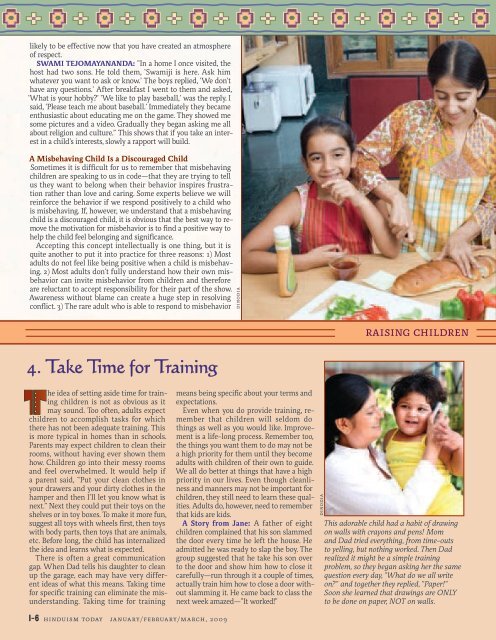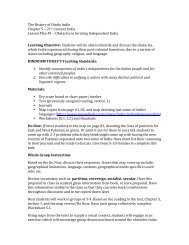Hinduism Today January 2009 - Cover, Index, Front Articles
Hinduism Today January 2009 - Cover, Index, Front Articles
Hinduism Today January 2009 - Cover, Index, Front Articles
Create successful ePaper yourself
Turn your PDF publications into a flip-book with our unique Google optimized e-Paper software.
likely to be effective now that you have created an atmosphereof respect.Swami Tejomayananda: “In a home I once visited, thehost had two sons. He told them, ‘Swamiji is here. Ask himwhatever you want to ask or know.’ The boys replied, ‘We don’thave any questions.’ After breakfast I went to them and asked,‘What is your hobby?’ ‘We like to play baseball,’ was the reply. Isaid, ‘Please teach me about baseball.’ Immediately they becameenthusiastic about educating me on the game. They showed mesome pictures and a video. Gradually they began asking me allabout religion and culture.” This shows that if you take an interestin a child’s interests, slowly a rapport will build.A Misbehaving Child Is a Discouraged ChildSometimes it is difficult for us to remember that misbehavingchildren are speaking to us in code—that they are trying to tellus they want to belong when their behavior inspires frustrationrather than love and caring. Some experts believe we willreinforce the behavior if we respond positively to a child whois misbehaving. If, however, we understand that a misbehavingchild is a discouraged child, it is obvious that the best way to removethe motivation for misbehavior is to find a positive way tohelp the child feel belonging and significance.Accepting this concept intellectually is one thing, but it isquite another to put it into practice for three reasons: 1) Mostadults do not feel like being positive when a child is misbehaving.2) Most adults don’t fully understand how their own misbehaviorcan invite misbehavior from children and thereforeare reluctant to accept responsibility for their part of the show.Awareness without blame can create a huge step in resolvingconflict. 3) The rare adult who is able to respond to misbehaviordinodiaWant kids to behave? Nothing workslike sharing. Even the simple task ofmaking sandwiches together createsclose ties and gives young ones a sense ofimportance and belonging. This preventsmisbehavior caused by discouragement.with positive encouragement will oftenbe rejected by the child. This is becausechildren (like most of us) are not alwaysreceptive to encouragement when theyneed it the most. They are too emotionallyupset to accept it. The solution: waitfor a cooling‐off period and try again withencouragement.The child who needs love the most isoften the child who acts the most unlovable.Understanding the four mistakengoals of behavior helps adults rememberwhat children are really saying with theirmisbehavior: “I just want to belong.” Italso helps us know what to do to resolvethe problem in ways that are encouragingwhile teaching children life skills.Think of the misbehavior as a code andask yourself, “What is she really tryingto tell me?” The child is not consciouslyaware of her coded message, but will feeldeeply understood when you deal withher hidden belief instead of reacting to thebehavior. You will feel differently if youremember that behind the misbehavior is a child who just wants tobelong and is confused or unskilled about how to accomplish thisgoal in a socially useful way. Look closely to see if your words andactions are causing the child to believe she doesn’t belong or havesignificance.The following chart shows the four mistaken goals and correspondingbeliefs that motivate misbehavior.A Child’sMistaken GoalUndue AttentionMisguided PowerRevengeAssumed InadequacyCorrespondingErroneous Belief“I belong only when I haveyour attention.”“I belong only when I’m the boss, or at leastwhen I don’t let you boss me.”“I don’t belong, but at leastI can hurt back.”“It is impossible to belong.I give up.”Undue Attention: Everyone wants attention There is nothingwrong with that. The problem occurs when a child wants excessiveattention. In other words, she seeks belonging in annoying waysrather than useful ways. The behavior is annoying because it comesfrom the child’s mistaken belief of the moment: “I belong only whenI am the center of attention.” This belief adds a sense of urgency andpersistence to the behavior that others find annoying. It can be veryencouraging to children seeking undue attention to redirect them toget attention in contributing ways, such as helping you with a task.Misguided Power: Everyone wants power. Power is not a bad thing;it depends on how it is used. When children have the mistaken beliefraising children14 strategies parents need to know4. Take Time for TrainingThe idea of setting aside time for trainingchildren is not as obvious as itmay sound. Too often, adults expectchildren to accomplish tasks for whichthere has not been adequate training. Thisis more typical in homes than in schools.Parents may expect children to clean theirrooms, without having ever shown themhow. Children go into their messy roomsand feel overwhelmed. It would help ifa parent said, “Put your clean clothes inyour drawers and your dirty clothes in thehamper and then I’ll let you know what isnext.” Next they could put their toys on theshelves or in toy boxes. To make it more fun,suggest all toys with wheels first, then toyswith body parts, then toys that are animals,etc. Before long, the child has internalizedthe idea and learns what is expected.There is often a great communicationgap. When Dad tells his daughter to cleanup the garage, each may have very differentideas of what this means. Taking timefor specific training can eliminate the misunderstanding.Taking time for trainingmeans being specific about your terms andexpectations.Even when you do provide training, rememberthat children will seldom dothings as well as you would like. Improvementis a life-long process. Remember too,the things you want them to do may not bea high priority for them until they becomeadults with children of their own to guide.We all do better at things that have a highpriority in our lives. Even though cleanlinessand manners may not be important forchildren, they still need to learn these qualities.Adults do, however, need to rememberthat kids are kids.A Story from Jane: A father of eightchildren complained that his son slammedthe door every time he left the house. Headmitted he was ready to slap the boy. Thegroup suggested that he take his son overto the door and show him how to close itcarefully—run through it a couple of times,actually train him how to close a door withoutslamming it. He came back to class thenext week amazed—“It worked!”dinodiaThis adorable child had a habit of drawingon walls with crayons and pens! Momand Dad tried everything, from time-outsto yelling, but nothing worked. Then Dadrealized it might be a simple trainingproblem, so they began asking her the samequestion every day, “What do we all writeon?” and together they replied, “Paper!”Soon she learned that drawings are ONLYto be done on paper, NOT on walls.5. Give a HugIn many cases adults can help childrenchange their behavior when they stopdealing with the misbehavior and dealwith the underlying cause: discouragement.Encouragement is providing opportunitiesfor a child to develop the perceptions, “I’mcapable, I can contribute, and I can influencewhat happens to me or how I respond.”Encouragement is teaching children the lifeskills and social responsibility they need tobe successful in life and relationships. Suchsupport can be as simple as giving them a hugto help them feel better and thus do better.A Story from Jane: A young father wasfrustrated and perplexed about the frequenttemper tantrums of his four-year-old son.Scolding or punishing only increased thetantrums. The father learned in his parentingclass that a misbehaving child is a discouragedchild, and that encouragement isthe best way to deal with misbehavior. Theidea seemed backward to him—sort of likerewarding unruliness. Still, he was intriguedwith the idea that children do better whenthey feel better. He decided to test the theory.The next time his son started a tantrum,the father got down on one knee and shoutedabove the racket, “I need a hug.” His sonpaused and asked through his sobs, “What?”The father shouted again, “I need a hug.” Hisson stopped sobbing long enough to ask incredulously,“Now?!?” The father said, “Yes,now.” The son seemed totally bewildered,but he stopped his temper tantrum and saidsomewhat begrudgingly, “Okay.” Then hestiffly gave his father a hug. Soon the stiffnessdisappeared and they melted into eachother’s arms. After a few moments the fathersaid, “Thanks, I needed that.” His son said,with a small tremor on his lips, “So did I.”Remember timing. Sometimes hugs don’twork because the child is too upset to give orreceive a hug or any kind of encouragement.You can still try. If the child is unwilling,you can say, “I sure would like a hug wheneveryou are ready,” and then leave the area.Parents report that when they try this, thechild usually comes after them right awaywanting a hug.dinodiaAshwin was playing in the rain and ignoredhis mother’s call to come inside. He waspeeved, and Mom was growing impatientand went out to fetch him. She surprisedher son by saying she was really hot andneeded a wet hug. They both laughed ashe tried to smother her in hugs and kisses.Next time he will want to please Mom.I-6 hinduism today january/february/march, <strong>2009</strong> january/february/march, <strong>2009</strong> hinduism today I-7
















